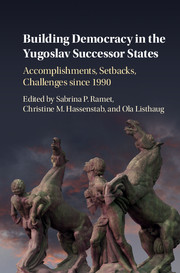 Building Democracy in the Yugoslav Successor States
Building Democracy in the Yugoslav Successor States Book contents
- Frontmatter
- Dedication
- Contents
- List of Boxes
- List of Figures
- List of Tables
- Notes on Editors
- Notes on Contributors
- Preface
- Part I Introduction and Theory
- 1 The Challenge of Democratization: An Introduction
- 2 Post-Yugoslav Patterns of Democratization
- 3 The Importance of Tolerance: Intolerance and Its Consequences in the Yugoslav Successor States
- 4 Institutional Trust in the Yugoslav Successor States: A Comparative Approach
- 5 Political Culture in the Yugoslav Successor States
- 6 The Impact of the ICTY on Democratization in the Yugoslav Successor States
- Part II Country Studies
- Part III Conclusion
- Further Reading
- Index
4 - Institutional Trust in the Yugoslav Successor States: A Comparative Approach
from Part I - Introduction and Theory
Published online by Cambridge University Press: 25 May 2017
- Frontmatter
- Dedication
- Contents
- List of Boxes
- List of Figures
- List of Tables
- Notes on Editors
- Notes on Contributors
- Preface
- Part I Introduction and Theory
- 1 The Challenge of Democratization: An Introduction
- 2 Post-Yugoslav Patterns of Democratization
- 3 The Importance of Tolerance: Intolerance and Its Consequences in the Yugoslav Successor States
- 4 Institutional Trust in the Yugoslav Successor States: A Comparative Approach
- 5 Political Culture in the Yugoslav Successor States
- 6 The Impact of the ICTY on Democratization in the Yugoslav Successor States
- Part II Country Studies
- Part III Conclusion
- Further Reading
- Index
Summary
Successfully building new democracies depends on the development of a viable political culture that brings citizens together regardless of their location within the cleavages and divides of society. This has been a critical part of the democratization process in the Yugoslav successor states. The purpose of this chapter is to investigate how far these countries have come in establishing citizens’ trust in institutions. We see institutional trust as a key aspect of political culture. Much of scholarly interest in the democratic development of the successor states has focused on the choice of new institutions, including the complex institutional structures that have been implemented in many countries, with Bosnia-Herzegovina as the most striking case. Instead of analyzing these new institutions in detail, we study how citizens themselves evaluate their institutions, with an emphasis on the public's confidence in the main national institutions, specifically the parliament, civil institutions, and institutions assuring public order (such as the armed forces, the police, and the justice system). For comparative purposes, we also evaluate the level of trust in the European Union held by those same citizens.
The advantage of studying citizens’ trust in institutions rather than investigating the institutions themselves is that it is hard to determine a priori criteria against which institutions should be evaluated. Due to the inherent intricacy of domestic institutions, they are also difficult to compare. Comparing trust in the same institutions, on the other hand, is relatively straightforward. Previous research has shown that institutional performance is a key determinant of political trust, and institutional trust can therefore be seen as a simple performance indicator of how citizens evaluate their institutions.
If citizens develop confidence and trust in the new institutions, this indicates that the institutions are working. We know from previous research that it is difficult to establish clear criteria or cut-off points for high and low levels of trust, and that comparisons over time or across countries are necessary in order to evaluate how well institutions are perceived to be performing. This means that reported levels of trust should not be interpreted in absolute terms. However, repeated measurements over time as well as cross-country comparisons provide information on relative values.
- Type
- Chapter
- Information
- Building Democracy in the Yugoslav Successor StatesAccomplishments, Setbacks, and Challenges since 1990, pp. 87 - 107Publisher: Cambridge University PressPrint publication year: 2017
- 2
- Cited by


